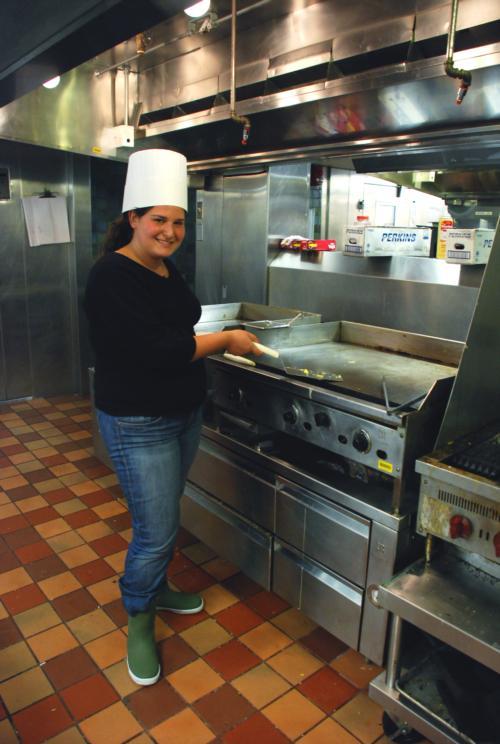
Gourmet Food For Thought
I decided to go into the restaurant industry over the last few bites of the best ham and cheese sandwich I had ever tasted. It was actually more like a roll-up. Or a wrap, perhaps, if you imagine the familiar thin tortilla-like casing replaced with extra fluffy crust-free white bread devoid of any hint of soggyness despite its precarious position spiraled perfectly around melted cheese and thin, warm ham. It was cut in half, placed on a platter of crispy, hand-cut, lightly salted potato chips and set in front of me in the bar room of the Hotel Majestic in Barcelona. It was the summer before my senior year and I was celebrating the end of my 10-week magazine internship in New York with a week spent gloriously feasting on Spanish delicacies—salty chorizo and ripe pan con tomato, crispy croquettes and hot patatas bravas, washed down with sugary shots of melacoton.
But this strange wrap-roll-up-sandwich creation was unlike anything I had previously encountered. I savored each bite and, to my dining companion’s unsurprised boredom, chronicled each delicious detail that made the platter so utterly delectable. As I clawed the remnants of sticky, sweet cheese off my devoured plate, my blabbering became a monologue on how the dish—so close to perfection—might yet be bettered still.
“You have to pursue this,” my friend said after my gastronomical ramblings had at last come to a close. And, in a rare moment of concession, I realized he was right.
This thought was not entirely revelatory. My friends had long been subjected to lengthy descriptions of the restaurants I would some day open. They had heard the amateur, now discarded plans of my initial dreaming: the sushi bar built over a tank of live fish (how postmodern!); the dumpling restaurant with a twist, where mac and cheese or duck l’orange would be served up in crisp wonton wrappers or savory shumai shells (titled, for its brief reign in theoretical existence, “Dim Sumthing Else”). A few lucky listeners had even become privy to my newest conception of culinary excellence, still turning and tweaking, and much too precious for the pages of such a widely-read campus magazine. But to dream of my eventual collection of award-winning eateries was one thing. To venture into the industry straight from Harvard’s gates is quite another.
For one, I had a résumé that read much like that of many an English concentrator and budding journalist that came before. Internships at publishing houses and magazine corporations, articles penned for an odd collection of campus publications, the cherished (if inactive) title of Crimson editor. I had planted myself firmly on a road well paved with Harvard grads of the past and was about to veer off-track due to a momentary decision in the hazy afterglow of a ham and cheese sandwich.
I came back to America and unveiled the revised plan to my parents: I would work in restaurants for any restaurateur that would hire me so I could learn the industry from the ground up. They were slightly perplexed, but I seemed passionate, so they tried their best to hide it (“How about restaurant consulting?” they asked. No, no). I began pursuing the dream by stalking every friend of a cousin of a friend I could get my hands on. They, too, were often perplexed—“You seem to be right on the road to a fantastic career in journalism. Why not pursue that?” they asked. I crafted an answer and a cover letter to offer an explanation, and some of them even seemed convinced.
Then one victim of my relentless pursuit articulated what the others seemed to be implying all along: “Do they even allow Harvard graduates to go into the restaurant business? Because I can’t think of any.” And, as an afterthought: “But as long as I have you here, how much do you know about food?” I could answer the latter with ease, less because of my vast array of culinary knowledge than the skillful art perfected by any graduating English concentrator of elegantly saying nothing at all. The first, however, gave me pause.
It too, of course, could be answered, with a bit of persistence and some quality time on Google. But the question lingered. Am I not only avoiding the finance superhighway, but actually any real road out of the Ivory Tower altogether? More worrisome still, am I making a huge mistake?
As I have forged ahead, however, talked to restaurateurs in what must be the hundreds, and now press closer (hopefully, someday, maybe) to securing a job for the now too-near future, my confidence in my own strange road is budding. It is odd, but exciting. A new twist. Refreshing. Kind of like a ham and cheese wrap-roll-up-sandwich on your last day in Barcelona.
— Rebecca A. Kaden ’08, a Crimson editorial writer, is an English and American literature and language concentrator in Kirkland House. She does not, unsurprisingly, enjoy a nice meal à-la-HUDS.


